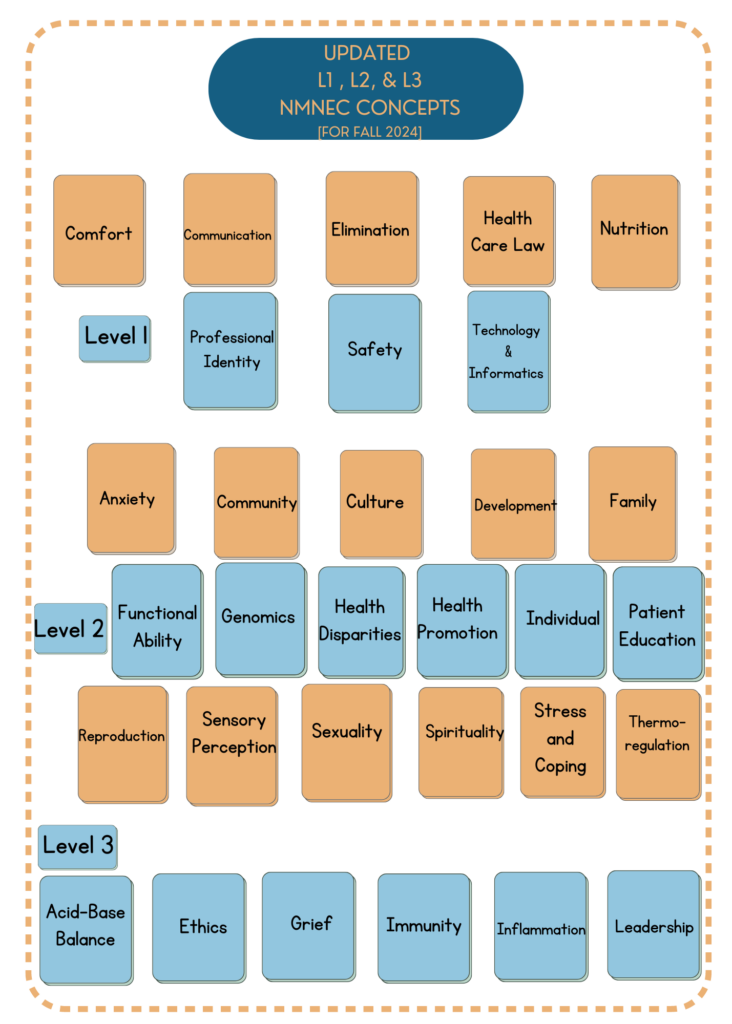
2024 Updated NMNEC Concepts
Edits/Changes Summarized
These concepts were updated and then peer-reviewed and approved by NMNEC Curriculum Committee in the 2022-2023 and 2023-2024 academic years.
These updated concepts were approved by Leadership Council in February & April 2024
| Updated Level 1 Concepts | A ‘Diversity, Equity, and Inclusion Considerations’ section was added, and citations & references were updated for every concept. In addition, some concepts had additional changes summarized below: |
| Comfort | Concept rewritten to be broader in scope (previously focused only on pain and nausea) Required Medications with Concept added. Previous detailed content on pain and nausea exemplars pulled out into a teaching resource document: Comfort.Teaching Information on Required Exemplars of Pain and Nausea.01.18.24 |
| Communication | |
| Elimination | Definition updated. Required Medications with Concept added. |
| Evidence | Updated in January 2022 – Not part of the 2022-2024 Concept Reviews |
| Health Care Law | |
| Nutrition | Required Medications with Concept added. |
| Professional Identity | |
| Safety | |
| Technology & Informatics |
| Updated Level 2 Concepts | Edits/Changes in addition to the addition of a ‘Diversity, Equity, and Inclusion Considerations’ section and updating of citations & references] |
| Anxiety | Grammatical edits in definition but essentially unchanged. Required Medications with Concept added. |
| Community | Healthy People citations were updated. |
| Culture | |
| Development | |
| Family | |
| Functional Ability | Interrelated concepts updated. |
| Genomics | Healthy People 2020 content and citations were removed as content had been removed from current Healthy People 2030. March of Dimes citations updated. |
| Health Disparities | |
| Health Promotion | Exemplars updated: Added: For Primordial Prevention Reduction of barriers to physical activity for children Healthy sleep in children For Primary Prevention Risk Reduction: Helmet use in preventing head injuries (bicycling, ski/snowboard) (replaces Immunization clinics and hand washing – both covered in L1) |
| Individual | Information on theoretical models updated as reflective of newer references than previously. Cultural competence changed to cultural humility. |
| Patient Education | |
| Reproduction | Required Medications with Concept added. |
| Sensory Perception | Required Medications with Concept added. |
| Sexuality | Language on sexuality updated. Required Medications with Concept added. |
| Spirituality | |
| Stress and Coping | Scope/categories language broadened to stress-neutral, challenge-manageable, and threat not manageable. Inter-related concepts were edited to add Immunity and Health Promotion concepts and to remove Mood & Affect, and Culture concepts. |
| Thermoregulation |
| Updated Level 3 Concepts | Edits/Changes in addition to the addition of a ‘Diversity, Equity, and Inclusion Considerations’ section and updating of citations & references] |
| Acid-Base Balance | Concept definition changed: Previous definition: Factors that affect the regulation of pH and conditions that contribute to imbalances. Updated definition: To maintain homeostasis, the human body employs many physiological adaptations. One of these is maintaining an acid-base balance. In the absence of pathological states, the pH of the human body ranges between 7.35 to 7.45, with the average at 7.40. Acid base balance is a dynamic interplay between three processes: acid production or intake, acid buffering and acid excretion. Nutrition and Perfusion concepts were removed as interrelated concepts to shorten the list while still adequately identifying the priority inter-related concepts for Acid Base Balance. |
| Ethics | Diversity, Equity, and Inclusion Considerations section referred to NMNEC Diversity Committee for feedback and suggestions. NMNEC Diversity Committee reviewed and rewrote and then returned to NMNEC Curriculum Committee. |
| Grief | Added ‘Ambiguous Grief’ as a category. Removed references to ‘spouses’ and ‘married couples’ as being exclusive of other couples. Consequences section was rewritten to be more concise. Updated to include suicidal/homicidal ideation in objective assessment. |
| Immunity | Concept definition expanded: Previous definition: The expected and optimal physiologic immune response as well as conditions associated with an inadequate or excessive immune response. Updated definition: The expected and optimal physiologic immune response as well as conditions associated with an inadequate or excessive immune response. The immune response involves three primary protective functions: protecting body from invasion of microorganism or antigen, removing dead or damaged tissue and cells, and recognizing and removing cell mutations. Required Medications with Concept added. |
| Inflammation | Concept definition changed: Previous definition: An immunological defense against tissue injury, infection, or allergy.” (Sabo, 2017, p.230) It is a non-specific by complex response to what the body perceives as harmful. Updated definition: The inflammatory response is the body’s way to repair and heal cell injury. This response depends on many variables including extent of injury and a patient’s disease history (Harding., 2023). Required Medications with Concept added. |
| Leadership |
All updated concept documents are available to NMNEC faculty for use starting in Summer or Fall 2024 in the faculty area of website under Concepts folder and in the respective L1, L2, & L3 folders.
On 06/25/24, the NMNEC Leadership Council approved the three remaining L2 concept updates (Genomics, Individual, and Stress and Coping) plus one L3 concept update (Ethics).
The remaining L3 concepts not in the above lists are in process of being updated and will be added when review process completed and approved during the 2024-2025 academic year.

Recent Comments